According to Mai Thi Thuy, a Bachelor of Nutrition from the Nutrition Department at Xuyen A General Hospital in Ho Chi Minh City, blood is like your body's superhighway. It carries nutrients and oxygen everywhere, from the heart and brain to muscles and skin. A healthy diet is one way to optimize blood circulation. Combined with exercise, adequate hydration, weight management, and not smoking, certain superfoods can help improve blood circulation and boost cardiovascular health. However, those taking anticoagulants should consult their doctor before making any dietary changes.
Garlic
Garlic contains a sulfur compound called allicin, which helps relax blood vessels. Studies show that people who eat more garlic have more efficient blood flow, which helps the heart not have to work as hard to pump blood throughout the body, helping to maintain low blood pressure.
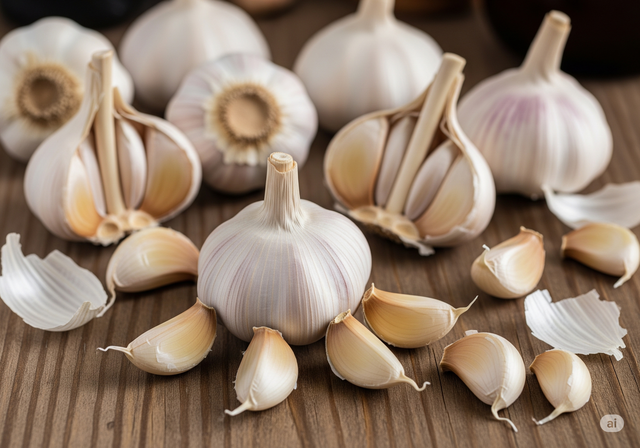
Garlic contains a sulfur compound called allicin, which helps relax blood vessels.
Photo: AI
Turmeric helps improve blood circulation.
The most important active ingredient in turmeric is curcumin, a compound with powerful anti-inflammatory and antioxidant properties. Many modern studies show that curcumin can inhibit enzymes involved in blood clotting, thereby reducing the risk of blood clot formation in blood vessels. Curcumin can also promote nitric oxide production, which helps dilate blood vessels. As a result, blood flows more easily to muscles and other tissues.
Pomegranate
The small, juicy red seeds inside a pomegranate are packed with special substances, especially antioxidants and nitrates. These substances help increase nitric oxide production, increase blood flow, lower blood pressure, promote blood circulation, dilate blood vessels, prevent arteries from hardening and thickening, allowing blood to flow more smoothly.
Fatty fish
Fatty fish such as salmon, mackerel, trout, herring, and halibut are rich in omega-3 fatty acids. Omega-3s are considered "silent heroes" for cardiovascular health due to their ability to reduce inflammation, improve blood lipid levels, and support circulation. They can reduce platelet aggregation, thereby limiting blood clot formation and maintaining blood viscosity at a safe level. Omega-3s also contribute to lowering triglycerides, supporting heart rhythm regulation, and protecting blood vessels, helping to reduce the risk of heart attack and stroke.
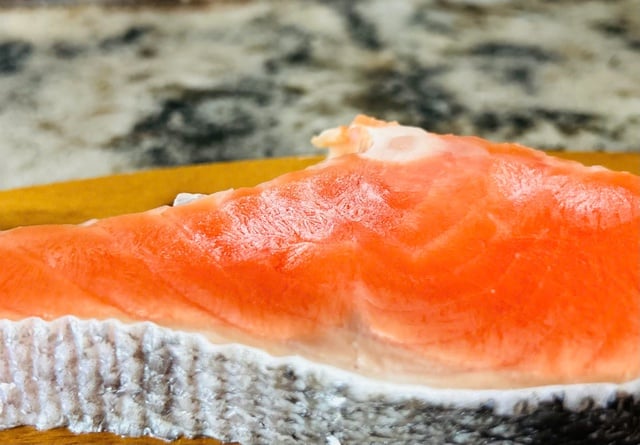
Omega-3s in fatty fish are good for cardiovascular health due to their ability to reduce inflammation, improve blood lipid levels, and support circulation.
PHOTO: LE CAM
Citrus fruits
Flavonoids, which are rich in flavonoids, can reduce inflammation in the body, lessen arterial stiffness, prevent blood clots, and improve blood flow. Additionally, they may help lower blood pressure.
Berries (blueberries, strawberries, raspberries) and grapes
Berries are rich in polyphenols and flavonoids, powerful antioxidants that can reduce inflammation, protect the vascular endothelium, and improve arterial elasticity. Anthocyanins can help protect arterial walls from damage and prevent atherosclerosis. Furthermore, anthocyanins promote nitric oxide release, enhance endothelial function, and help lower blood pressure.
Watermelon
Watermelon contains citrulline, which is converted into arginine, helping to increase nitric oxide and improve blood flow. Lycopene, a natural antioxidant in watermelon, is also associated with improved blood circulation.
Kiwi, pineapple, peach, plum
In addition, the fruits mentioned above and some others (kiwi, pineapple, peach, plum, etc.) contain salicylates - a natural compound that acts similarly to aspirin, inhibiting platelet aggregation and thus acting as a mild natural anticoagulant.
Spinach, leafy greens
Rich in nitrates, spinach can improve blood circulation. These compounds help dilate blood vessels, creating more space for blood to flow. Additionally, one study showed that a diet rich in spinach helps maintain arterial elasticity and lowers blood pressure. Leafy green vegetables thin the blood and help oxygen circulate throughout the body more efficiently.
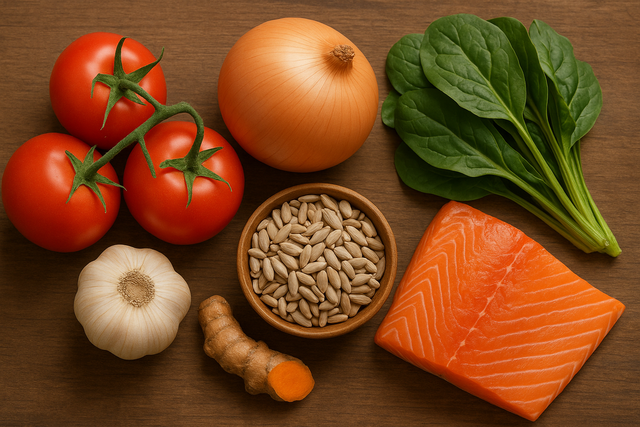
Tomatoes, onions, spinach... are superfoods that are good for blood vessels and cardiovascular health.
PHOTO: AI
Onion
Thanks to their richness in sulfur compounds and flavonoids, onions can reduce natural clotting factors, benefiting cardiovascular health and blood circulation. Additionally, onions contribute to a slight reduction in blood pressure, improve blood lipid levels, and support long-term cardiovascular health.
Tomato
Tomatoes, especially tomato juice, contain abundant amounts of natural salicylates, which act as a mild blood thinner. Lycopene in tomatoes, a powerful antioxidant, helps protect blood vessels, reduce inflammation, and combat oxidative stress—a key factor in the progression of atherosclerosis. Vitamin K in tomatoes helps control bleeding and clotting, while also improving blood circulation.
Nuts
Nuts such as sunflower seeds, almonds, and walnuts provide a rich source of vitamin E. For the cardiovascular system, vitamin E is particularly beneficial due to its ability to slow down blood clotting. Its mechanism involves directly affecting platelets, limiting their excessive clumping, thereby reducing the risk of blood clot formation.
Additionally, nuts with wrinkled shells like walnuts are rich in alpha-linolenic acid, an omega-3 fatty acid, which can help blood flow smoothly. One study showed that eating walnuts regularly for 8 weeks improved vascular health, making blood vessels more elastic and lowering blood pressure.
Dark chocolate
Dark chocolate (at least 70% cocoa) contains flavonoids that help relax blood vessels and improve endothelial function, thereby enhancing blood circulation.
Source: https://thanhnien.vn/an-gi-de-mau-luu-thong-tim-luon-khoe-185251025152903323.htm









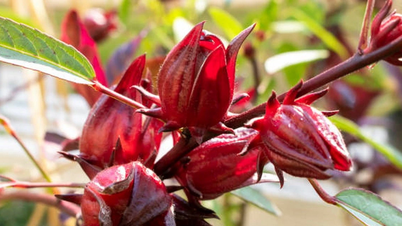



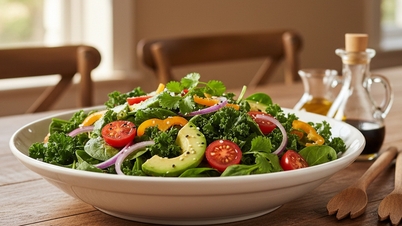
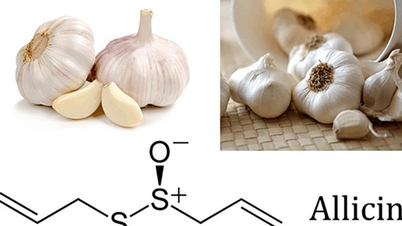











































































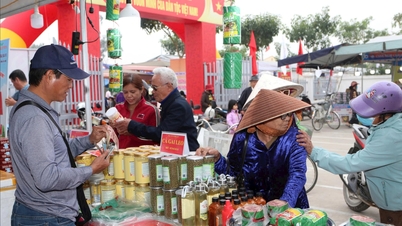




















Comment (0)